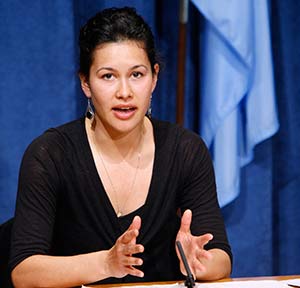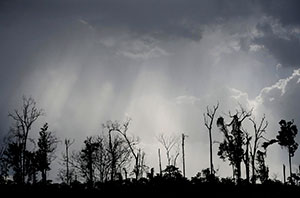LIMA, Peru –– Twenty years ago, a 12-year-old girl stood before government officials from most of the world’s countries and pleaded for her future. Canadian Severn Cullis-Suzuki, who pleaded on behalf of her generation during the 1992 Earth Summit in Rio de Janeiro, will return to Rio in late June, when delegates gather again to try to map a sustainable course for the world’s 7 billion people. Cullis-Suzuki is pictured speaking at the United Nations in 2010 in New York. (CNS photo/Mark Garten, UN) Worried about pollution and overuse of natural resources on her finite planet, she begged, “If you don’t know how to fix it, please don’t break it.”
Canadian Severn Cullis-Suzuki, who pleaded on behalf of her generation during the 1992 Earth Summit in Rio de Janeiro, will return to Rio in late June, when delegates gather again to try to map a sustainable course for the world’s 7 billion people. Cullis-Suzuki is pictured speaking at the United Nations in 2010 in New York. (CNS photo/Mark Garten, UN) Worried about pollution and overuse of natural resources on her finite planet, she begged, “If you don’t know how to fix it, please don’t break it.”
The occasion was the 1992 Earth Summit in Rio de Janeiro, which ended with the world’s countries committing – at least on paper – to make environmental concerns a priority and eliminate unsustainable forms of production and consumption. Above all, delegates agreed that development must not jeopardize the welfare of future generations.”
Reminding the grownups in the room that their children and grandchildren deserved a decent life, too, the girl asked, “Are we even on your list of priorities?”
Canadian Severn Cullis-Suzuki – who pleaded on behalf of her generation then and who now has a toddler and an infant of her own – will return to Rio in late June, when delegates gather again to try to map a sustainable course for the world’s 7 billion people.
The theme is one often raised by Pope Benedict XVI. During a Sunday blessing last November, he urged delegates to an international climate conference to consider “the needs of the poorest and future generations.”
A few days later, he told young Italian members of a Franciscan environmental group, “There is no good future for humanity or for the earth unless we educate everyone toward a style of life that is more responsible toward the created world.”
Many observers, however, are dubious that delegates in Rio will map a route toward that lifestyle. So far, negotiators have failed to agree on the summit document, which was supposed to be 90 percent complete before the summit begins; an additional writing session was scheduled May 29-June 2.
Industrialized and developing countries have taken different stands on one of the summit’s key themes, the “green economy,” as well as a proposal to set “sustainable development goals” modeled on the Millennium Development Goals, which defined targets in areas such as health, education, maternal and child welfare and poverty reduction, with 2015 as the deadline.
“All people tend to find it easier to borrow than to pay back, but environmental debt, like all debt, tends to catch up with us,” Robert Engelman, director of the nonprofit Worldwatch Institute in Washington, said in April at the presentation of the organization’s annual State of the World report.
Titled “Moving Toward Sustainable Prosperity,” the report offers input for the Rio conference. Cullis-Suzuki spoke at the presentation via video link.
Engelman said the world needs “creative thinking about how to restructure economies, governance and our own lives.” The remains of virgin Amazon rainforest are seen after it was cleared for its wood along a highway near a town in Moju, Brazil, May 26. Delegates will gather for the 2012 Earth Summit in Rio de Janeiro June 20-22 to try to map a sustainable course for the world’s 7 billion people. (CNS photo/Lunae Parracho, Reuters)
The remains of virgin Amazon rainforest are seen after it was cleared for its wood along a highway near a town in Moju, Brazil, May 26. Delegates will gather for the 2012 Earth Summit in Rio de Janeiro June 20-22 to try to map a sustainable course for the world’s 7 billion people. (CNS photo/Lunae Parracho, Reuters)
“Sustainable prosperity” is one name for a goal that would be reached when everyone’s basic needs are met, the dignity of all people is respected, and everyone is free to pursue happiness and allow others to do the same, according to speakers at the Worldwatch presentation.
“We need a new global solidarity for sustainability … that can produce win-win outcomes for everyone,” Worldwatch researcher Michael Renner said. “The winners will ultimately lose if the losers can’t win.”
In the market-driven world, development has become synonymous with economic growth, but Renner and others said that unlimited economic growth will strain the planet’s resources beyond their capacity. A key to sustainable development is “transforming a consumer culture,” said State of the World researcher Erik Assadourian. “We are trapped in a system that stimulates consumption.”
If everyone on the planet consumed at the rate of Americans, he said, the planet could support about 6.2 billion people, not the 7 billion who now inhabit it and a far cry from the 9 billion projected by the end of this century.
Suggestions for curbing consumption range from redistribution of tax burdens to retraining workers for a “green” economy. Such ideas, however, are likely to meet with opposition from both industrialized countries, which fear erosion of their standard of living, and developing countries, which exploit their natural resources to generate revenue to reduce poverty, provide services and build infrastructure.
The conflict plays out not only between nations, but also within countries. Throughout Latin America, rural communities are protesting plans for dams, mines, biofuel plantations and other large infrastructure projects. Proponents say the projects are crucial to maintain economic growth and support growing populations that want the comforts and conveniences – from private automobiles to televisions to smart phones – that are staples of life in industrialized countries.
Opponents say the projects’ social and environmental costs outweigh their benefits. Many opponents are indigenous people who espouse a principle called “buen vivir,” a Spanish term that means, roughly, “living well.”
They argue that while most people in Western society are intent on “living better” and obtaining more things, indigenous people only want to “live well,” meeting their own needs in a way that leaves enough for future generations.
Despite the skepticism over the Rio summit, Cullis-Suzuki finds hope at the grass roots.
“Real change lies in the communities,” she told the audience at the Worldwatch presentation. “Because we love our children, we must and we will find a way to become sustainable.”
